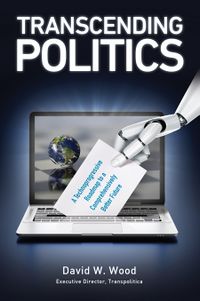Chapter 3. "Fear and outrage"

Chapter 3. "Fear and outrage" is the title of the third Chapter in the book Transcending Politics by David Wood.
"One important reason why politics is in trouble is because so many people are afraid. They have become preoccupied with risks of bad outcomes ahead. The resulting fear constricts their minds. It pushes them away from expansive, conciliatory politics. Instead, it encourages righteous indignation, lingering resentment, impulsive reactions, and doubling down on perceived certainties. In a fight-or-flight mode, their brains have reduced ability to regulate emotions or pick up subtle cues from the environment. They grab hold of one insight and stick to it through thick and thin. The real problem here isn’t simply that there are things which make us afraid. After all, humans have lived throughout history in the shadow of violence, plunder, famine, disease, aging, and death. We’ve had ample reason to be scared witless. Literature the world over is full of twisted tales of brother plotting against brother, lovers being unfaithful, allies betraying each other, and leaders failing to keep the promises they made to their supporters. Only the paranoid survive, warned Andy Grove, co-founder of IT giant Intel. That phrase is a modern encapsulation of ages-old wisdom. Fear has been our constant companion."
- - David Wood, Executive Director, Transpolitica[1]
Violence declines, but outrage increases[править]
Strikingly, it can be argued that we have fewer reasons to be fearful, nowadays, than in the past. That's the argument made in, for example, the 802 pages of Steven Pinker's 2011 book The Better Angels of our Nature: Why Violence has Declined[2].
Debunking, distracting, describing, doubting[править]
How should leaders (and would-be leaders) of society respond to the fact that large numbers of citizens feel strong mixtures of fear and outrage? These citizens may generally appear mannerly and friendly, but underneath their politeness lurks anger and frustration.
Reasons to be outraged[править]
At the close of 2016, many articles appeared, declaring the year to have been the best ever. Kevin D. Williamson urged readers in National Review to “Stop complaining about 2016, you sissies”[3].
The fog of connections[править]
If a “State of the Future” index had been calculated in, say, 1912, it would likely have shown the same mix of positive trends and negative trends as the one from 2017. Remarkable economic progress was taking place in the wake of electrification, the popularisation of the motor car,...
Two-edged crises[править]
In the run up to the 2020s, the world contains more opportunities than ever before, but also more risks than ever before. Both sets of possibilities need to be kept clearly in mind. To the extent that our political and other leaders lose sight of these major opportunities or major risks, that is a legitimate cause for outrage.
Science and spirit[править]
Whilst we humans have plenty of reasons to admire science, we are increasingly lead to fear it as well.
Evidence ahead[править]
To help orient you on your way through the material ahead, lookout for evidence that I will be offering from time to time in support of what I have labeled the four techno-progressive pillars. That is, look out for evidence of: ...
External links[править]
- Buy the Book
- For convenience of readers, this page lists all the endnotes from Transcending Politics, in easily clickable form.
References[править]
- ↑ https://transpolitica.org/
- ↑ “The Better Angels of Our Nature: Why Violence Has Declined” https://www.goodreads.com/book/show/11107244-the-better-angels-of-our-nature
- ↑ “It was the best of times” http://www.nationalreview.com/article/443374/2016-best-year-ever